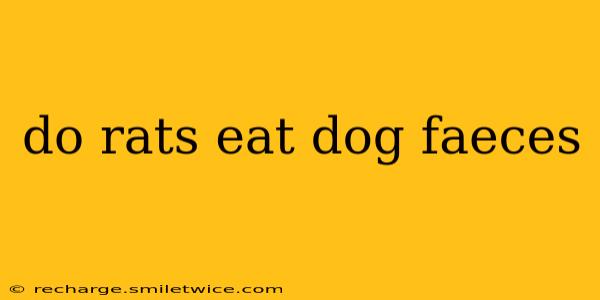Do Rats Eat Dog Faeces? A Look into Rodent Diets and Coprophagy
The question of whether rats eat dog faeces is a fascinating one, delving into the complex world of rodent diets and survival strategies. While it might seem repulsive to us, understanding a rat's behavior requires looking at things from their perspective. The simple answer is: yes, rats can and will eat dog faeces, though it's not their preferred food source.
What Do Rats Typically Eat?
Before we delve into the specifics of coprophagy (the consumption of faeces), it's important to understand the typical diet of rats. Rats are omnivores, meaning they consume both plant and animal matter. Their diet usually includes:
- Grains: Rice, wheat, corn, and other grains are readily consumed by rats.
- Fruits and Vegetables: They'll happily munch on fallen fruit, vegetables, and even scraps from human food waste.
- Seeds and Nuts: A rich source of fats and proteins, these are highly attractive to rats.
- Insects and Other Small Animals: Rats are opportunistic feeders and won't hesitate to consume insects, worms, and even small rodents if the opportunity arises.
- Meat Scraps: Leftover meat from human meals is another readily available food source.
Why Would a Rat Eat Dog Faeces?
While not ideal, rats may resort to eating dog faeces under certain circumstances:
- Starvation: In situations where food is scarce, rats will consume virtually anything to survive, including dog faeces. This is a last resort driven by survival instincts.
- Nutrient Deficiency: Though not a primary source of nutrition, dog faeces might offer trace minerals or nutrients that a rat's body requires.
- Opportunistic Feeding: Rats are opportunistic feeders. If they encounter dog faeces and it presents itself as a potential food source, they might consume it.
Is it Harmful for Rats to Eat Dog Faeces?
Eating dog faeces presents potential health risks to rats. Dog faeces can harbor:
- Parasites: Dogs can carry various parasites that can be transmitted to rats through consumption of their faeces.
- Bacteria: Harmful bacteria present in dog faeces can lead to illness and infection in rats.
- Toxins: Depending on the dog's diet and health, dog faeces may contain toxins that could negatively impact the rat's health.
What are the Health Risks for Humans if Rats Eat Dog Faeces?
Indirectly, there could be a risk. If a rat is carrying a parasite or disease acquired from dog feces, and that rat then contaminates food or surfaces in your home, it could potentially lead to human health issues. Maintaining good hygiene, ensuring proper waste disposal, and controlling rodent populations are crucial steps in preventing such risks.
Are there any other animals that eat feces?
Yes, coprophagy is a relatively common behaviour across several animal species. Rabbits, for example, practice cecotrophy, consuming soft caecotrophs (night droppings) to get essential nutrients. Many other animals, driven by nutritional needs or instinct, may engage in coprophagy at times.
In conclusion, while rats prefer a more nutritious diet, they will eat dog faeces if necessary for survival. The practice can pose health risks to the rats themselves and potentially indirectly to humans. Effective rodent control and good hygiene practices remain crucial for preventing this and mitigating related health risks.
